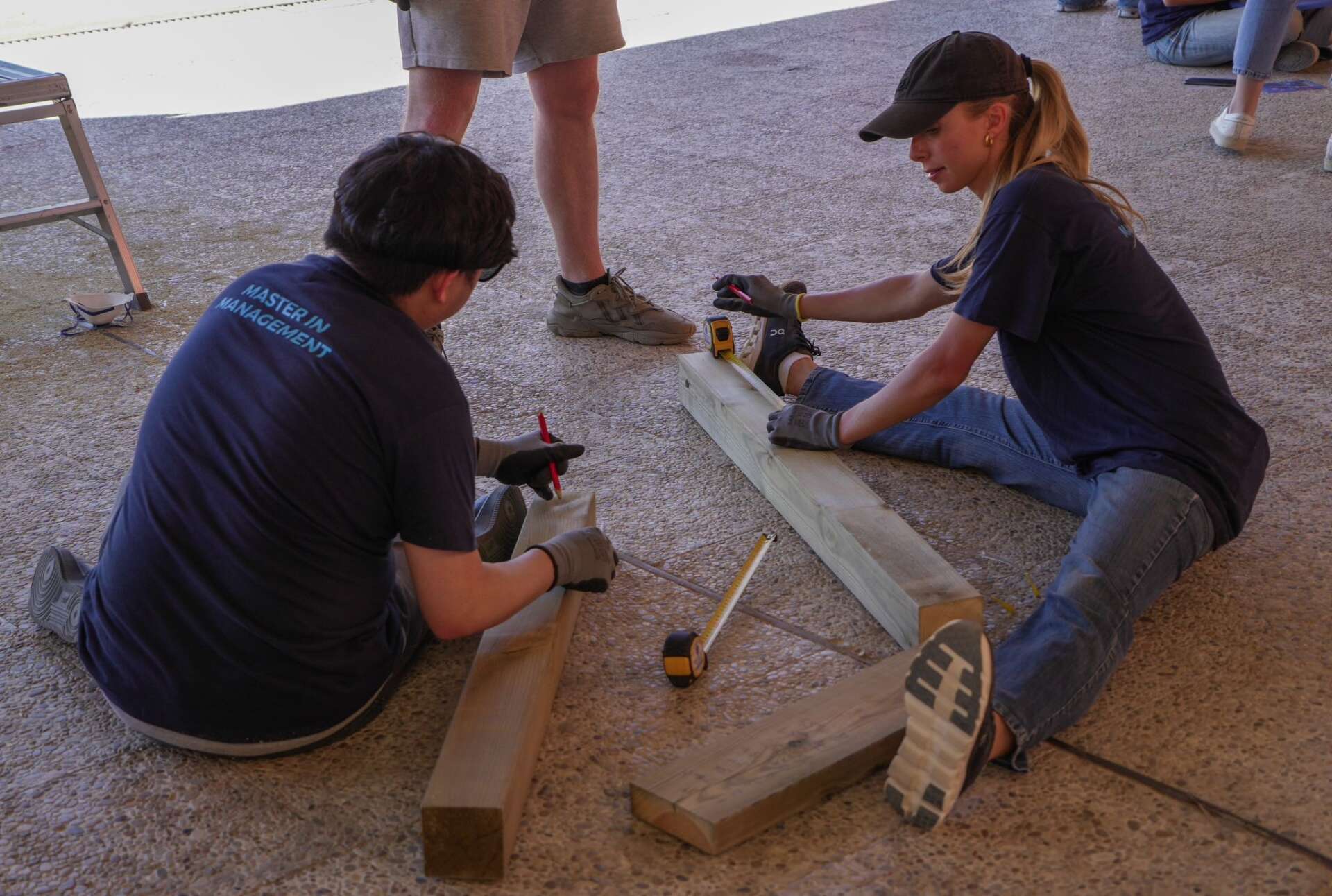
This article was published in the August 2023 edition of Business Impact magazine, the magazine for business schools.
They invited us to explain how Splash Projects help business schools fulfil their role teaching students about social impact , and why this is so important…
Business schools are increasingly judged on their contribution to sustainable development and bringing about positive social impact – purpose not profit. Here, Simon Poole, Managing Director of UK based Splash Projects explains why community projects are being incorporated more and more into Master’s degree programmes…
Seeing and experiencing social impact first-hand, watching disadvantaged children play on equipment you finished building for them five minutes before, is hands down the biggest motivator for social change. Seeing is believing – this may be a powerful thing, a common goal, has an even more profound effect on a person’s resolution to do good.
The multitude of challenges facing humanity and the natural world, from climate change and geopolitical tensions which have exacerbated in recent years, has undoubtedly affected the psyches of the younger generation and we have seen a shift in consciousness among those embarking on the first stage of their journeys to becoming global business leaders. They care about the world around them. And they want to be part of an educational establishment, and ultimately part of a business, which cares too.
Business development & sustainable impact
“The existence of businesses helps the world go round,” says Stephanie Villemagne, Chief Operation Officer of International Development at ESSCA School of Management. “Businesses drive economic growth for the planet, so the question is, how can we make sure that making money and business development are both sustainable and impactful? The answer starts with who is running these companies, so at the vanguard is education and business schools, because we are working with the very people who will be running these companies in the future.”
Business used to be synonymous with financial return, while business schools which fed into that world, were about leadership, innovation and driving competitiveness. These days, social responsibility has come to the fore and in a competitive market for talent, business leaders can no longer ignore those outside their immediate orbit. Maybe it has something to do with the epic fallout of the financial crash in 2008, and the realisation that those in power must shoulder responsibility for their decisions. More questions are circulating about who big business serves and holding the decision makers to account.
Business students care about social purpose
“Having a positive social impact is a vital element in projects and ventures for me and my peers,” says Sam Ferdinand, Business and International Relations student at IE Business School. “Many of us agree that the best way to have a positive impact on society is by doing well ourselves and then channelling our resources for a social purpose.
“Business schools train many of tomorrow’s biggest business leaders, so if in the future we wish to have a society with more socially responsible operations, said leaders should receive education in sustainability and social impact as a mandatory part of their curriculum. At the end of the day, business schools are currently responsible for much of how the economy will work in the future, so their role is key.”
The Deans of the world’s top business education establishments are listening to top students like Sam, and know their incoming cohorts want to “do well and do good”. As a result, globally, business schools are having to prove, not just to their prospective Master’s cohorts but also to Executive Education cohorts, those already in the upper echelons of large corporations, that they are doing their bit for the planet, both in terms of social justice and sustainable development, because this is what matters to those who are paying their tuition fees.
How do you measure social impact?
Ranking systems used to be about performance and profit, but those with a focus on social impact have popped-up in the last few years so it’s clear which establishment cares the most, and how it’s bringing about positive change beyond their campuses. It doesn’t just matter to the students but also employers who align themselves with the schools.
But currently, the parameters are vague because, how do you measure social impact? You can teach it and be an advocate for Environmental, Social, and Governance, but demonstrating your impact is different altogether. And each establishment’s focus may differ, for example, one may advocate environmental rather than social sustainability, or vice versa, while assessment metrics are broad and may include a university’s commitment to research on sustainability and social impact, its integration into teaching, provision of extra curricula opportunities etc.
One way of measuring social impact is through fulfilment of the UN’s 17 Sustainable Development Goals (SDGs) for 2030. Splash Community Projects have been supporting the SDGs since they were adopted by UN member countries in 2015. Through our learning and development programmes for businesses and business schools, participants get to build facilities out of timber for charitable initiatives which would otherwise never be able to afford the infrastructure. Working together, participants contribute to bringing about lasting positive social change in their local (business school) communities and experience what it feels like to make someone else’s life better.
The role of a Splash Project
As part of their efforts to do good beyond their campuses, this is why business schools such as HEC Paris, ESSCA, IE Business School, London Business School, Imperial Business School, ESSEC Business School and INSEAD – the Business School of the World, incorporate Splash Projects into their programmes. Some include them at the start, by way of inspiring and motivating students at the beginning of their learning journeys, giving brand new students the chance to bond over, often, the most meaningful experiences of their lives so far. And some opt to place them at the culmination of their students’ learning journeys, giving their graduates-in-waiting the opportunity to say ‘thank you’ to their host countries and leave their stamp in the community they called home for the duration of their courses.
While each business school may have additional specific learning objectives for including a Splash ‘community’ Project in their programmes, consistently, the fundamental reason they come to us is to give their students the chance experience positive social impact.
No one does what we do, and the demand for our projects is unprecedented. Last September was our busiest ever month with 10 projects running for eight charities, involving 1,650 participants in London, France and Spain with the London Business School, ESSEC, INSEAD, CEDEP and IE. Our project with ESSCA alone, involved 1,200 students over six campuses, impacting six charities.
Corporate Social Responsibility is becoming far more than a ‘nice to have’ these days. This is obvious to us through our involvement with INSEAD’s Executive Education programs over 16 years; these are often small-scale projects involving no more than 20 participants who have a day, or less, to build something that will have a huge impact on many people for years so come (like all our projects). Loïc Sadoulet, Affiliate Professor of Economics at INSEAD requests that our designs incorporate a “wicked plan” designed to thwart their delivery approach, so the learning outcomes are particularly impactful for these teams.
A shift towards what matters
“We have an obligation to give the future leaders of the world the chance to understand the responsibility they have in helping society be a better place; setting that social barometer,” is the view of Patti Brown-Varnier, Executive Director for Academic Affairs & Program Delivery for MBA and Executive MBA programmes at HEC Paris. “Business schools used to be about profit margins and finance, accounting and marketing, all of which can be learnt online,” she explains. “But we’re seeing a shift towards what really matters; social responsibility and sustainable development. With Splash Projects giving them the power tools, literally, to fix the problems around us, tackle inequalities in society and have a lasting impact.”
Our most recent project with HEC Paris in April involved 156 MBA students over four days leaving their mark on the community they’d called home for 16 months in the form of a play area – a three-part shipwreck, seating areas and a chicken ‘hotel’. Through the build of these imaginative play facilities for young people at the Diapason Juvenile Behavioural Facility co-located with Buc, in central France, the cohort not only got to experience effective leadership and the power of teamwork, but also had the opportunity to ‘give back’ to others less fortunate.
“The projects prompt the students to ask themselves ‘how can I do more?’,” continues Patti. “There aren’t many of them not crying their eyes out at the end of a project because they’ve seen first-hand the impact they’ve had. They see what is needed to help others and want to be part of the solution.
“Splash Projects give students the chance to apply what they’ve learnt in the. They give them project management, communication, planning and networking skills. Each group builds a section of the entire build and then hands it over to the next group, giving them a sense of ownership and responsibility as part of a larger team.
“In the classroom, they’re not making an impact on anyone. Their Splash Project allows them to use what they’ve learnt and then leave a meaningful impact on others, so it completes the circle.”


